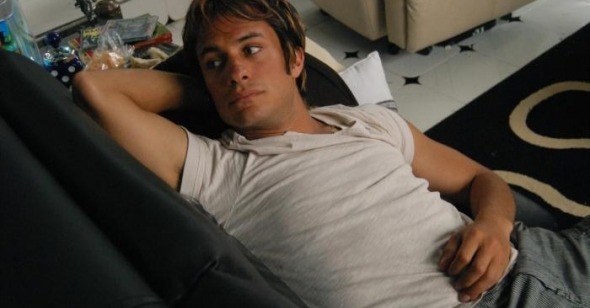Kicking and Screaming
by Eric Hynes
Rudo y Cursi
Dir. Carlos Cuarón, Mexico, Sony Pictures Classics
Rudo y Cursi, the debut film by Carlos Cuarón, has a bit of everything. Comedy, drama, satire, nostalgia, sports, music, city, country, tits, ass—all you could ever want, really. The first film produced under the Cha Cha Cha shingle—the union of Mexico’s cuddly auteurist trinity Alfonso Cuarón, Guillermo del Toro, and Alejandro Gonzalez Inarritu—Rudo y Cursi is an eager-to-please, mainstream entertainment machine. But as in a well oiled, whirring contraption that skips a gear, the moving parts never click into a working film. Tap on it and it topples.
Tato (Gael García Bernal) and Beto (Diego Luna) are brothers who work at a banana plantation while dreaming of better days. Tato (the cursi, or “corny,” one), single and superficial, plays a wheezing accordion and aspires to a career in music. Beto (the rudo, or “tough,” one) is married with children, but he hopes to play professional soccer. When a greasy talent scout happens upon a local match, he’s impressed by both striker Tato and goalie Beto, but only has one contract to offer. The brothers face off in a penalty shoot-out that sends Tato to Mexico City and Beto—the superior player—back to the banana plantation. But as Tato squanders his success on star-fucking and pop desperation (his cover of Cheap Trick’s “I Want You To Want Me” is spectacularly awful), Beto hustles his way up through the ranks, eventually becoming the country’s top goalie. One rises, the other falls, they switch places and then face off again for another shoot-out with everything on the line, and so on, the story rounding into neat symmetrical shape. Cuarón’s 21st-century parable shares with its religious and secular models a strict, unsparing morality and a beeline passage to the inevitable. But unlike Cain and Abel, Cuarón’s characters are equally, if differently, monstrous.
Tato and Beto are too thickly drawn and complete on the page for satisfying realization on screen. By prescribing their personalities from the film’s title on down, Cuarón forces Bernal and Luna to sketch in shorthand. More Abbott and Costello than Cain and Abel, Bernal and Luna mug and shamble their way through the film like desperate hams. Bernal brings to bear his talent for daredevil physicality, but his expression rarely wavers from an italicized, self-deluded grin and his voice—both speaking and singing—grates like a braying donkey’s. Similarly, Luna works his peasant’s mustache like a sketch comedy prop, exaggerating a down-turned mouth to project “sulk” to the back row, or letting his jaw fall in mouth-breathing stupidity. We’re not talking about Redford and Newman here, not by a long shot, but this reunion of the Y tu mama tambien heartthrobs even squanders whatever charms its stars have to offer (outside of the obligatory shower scenes).
Rudo y Cursi never hits on a consistent or convincing tone. It’s a comedy that’s more irritating than funny, a drama that can’t and won’t be taken seriously, a study of class that falls back on stereotypes, a showcase for Bernal and Luna that does them no favors, and a soccer film that doesn’t show any soccer. Either Cuarón and company don’t particularly care for soccer per se, or they think the film says more about it in absentia, but Rudo y Cursi avoids the sport to distraction. Neither lead looks like a professional athlete—to put it kindly—and without corrective on-field evidence their rise to superstardom plays like the conceit that it is. To fill the gap (or to sell what the film can’t supply), spirited scout Batuta (Guillermo Francella) narrates in unearned (and bizarre) soccer-as-life metaphors. “A love for a mother and a uniform are the same,” and also, “Loving a woman and a ball are the same.” What’s that? Mothers are for wearing? Lovers are for kicking? “The problem with loving the ball is that everyone wants her and she wants everyone.” Now the ball is a whore? Or are whores soccer balls? These are the ruminations of an untrustworthy narrator, to be fair, but they are as scattershot and half-baked as too much of Cuarón’s film. Like too many screenwriters turned directors, Cuarón fails to put his ideas in motion. And no, the jittery camerawork doesn’t count.
(This article originally appeared on indieWIRE.)
